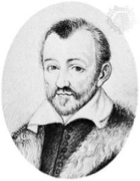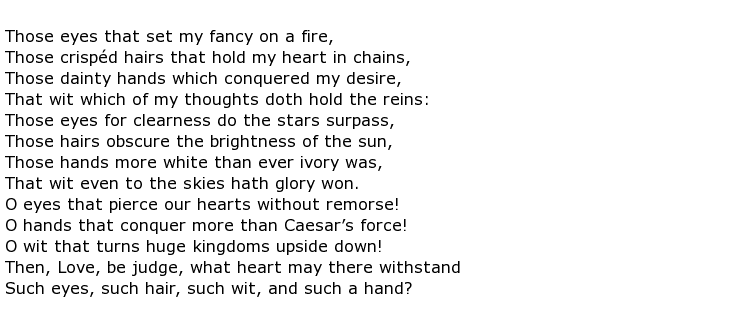 Philippe Desportes, his name sometimes written as Desports, was a late 16th century French poet and royal courtier who held prestigious posts such as secretary to the Bishop of Le Puy and advisor and personal poet to the Duke of Anjou. While accompanying the bishop he had the opportunity to spend time in Italy and he made use of his time by studying Italian poetry. His own poetry has been described as “light, facile verse” but it was fashionable in France at that time and his sonnets were adapted by the late Elizabethan poets.
Philippe Desportes, his name sometimes written as Desports, was a late 16th century French poet and royal courtier who held prestigious posts such as secretary to the Bishop of Le Puy and advisor and personal poet to the Duke of Anjou. While accompanying the bishop he had the opportunity to spend time in Italy and he made use of his time by studying Italian poetry. His own poetry has been described as “light, facile verse” but it was fashionable in France at that time and his sonnets were adapted by the late Elizabethan poets.
He was born some time during 1546 in Chartres but exact details of his early life are not clear. Presumably though he received a good education, as evidenced by the high profile appointments that were conferred upon him. While still only 21 he supplanted a fellow poet, one Pierre de Ronsard, as the favourite poet of the Duke of Anjou. The attachment thus formed proved profitable, especially when he accompanied the duke to Krakow for his coronation as King of Poland. This was only for a short time though as he gave up that position for the throne of France where he became King Henry III in 1574. Desportes had his first collection of poetry published during the same year. It was called Premières Oeuvres, which translates to First Works.
The king’s patronage was very useful to Desportes. Writing a number of poems for his king resulted in many favours being bestowed upon him, including the gift of the livings from the abbeys of Tiron and Josaphat in 1583. He wrote a number of elegies and sonnets, in graceful alexandrines, many of which were specifically for the king but other noblemen also received such works to present to their mistresses.
A key factor about Desportes’s writing though was that it relied a great deal on his close study of the Italian poets that he had been exposed to. He adopted a delicate style of writing which actually blatantly plagiarised the likes of Jacopo Sannazaro and Francesco Petrarch. This practice was eventually exposed with the publication, in 1604, of the Rencontres des Muses de France et d’Italie. In turn, English poets copied some of HIS work, especially his graceful sonnet writing.
Some of his poetry was intensely romantic, a good example being a piece called Conquest. It is a clear appreciation of the intense beauty that he sees in an unnamed woman. Here is the poem:

In 1573 a collection of his work was published which included well known pieces such as Œuvres chrêtiennes, Les Amours d’Hippolyte and Diane. Throughout his lifetime there seems to have been very little evidence of any religious themed writing despite his abbey connections. However, on reaching his later years, Desportes then acknowledged this “ecclesiastical preferment”, translating the Book of Psalms, a project which he completed between the years 1591 and 1603. This work was acknowledged favourably by some but attacked by others such as fellow poet François de Malherbe.
Phillipe Desportes died on the 5th October 1606 at the Abbey of Bonport. He was 60 years old.

